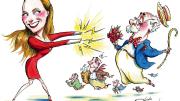Alexandra Petri ’10 has been funny as an amateur (a co-writer of two Hasty Pudding Theatricals, a writer for On Harvard Time, and a Class Day Ivy Orator) and professionally (as the ComPost opinion columnist for The Washington Post). In a self-important era, her humor is winningly self-deprecating. It now assumes longer form in A Field Guide to Awkward Silences (New American Library, $25.95). From the sixth chapter, about an unusual older acquaintance who shares Petri’s passion for the stage:
I have a strange affinity for old men. Not “older men,” the type who are fortyish but still in their prime, men like Mr. Big, who notice that you are stumbling along the sidewalk and stop their limousines….
No, not older men—old men. I must exude an oddly specific musk, like mothballs and racism.
I guess you could say this is my superpower. I can’t fly or freeze things with my breath…but I can summon elderly men from great distances. For instance, every Monday afternoon for months, I managed to attract visits from an octogenarian named Mr. Oliver.
Mr. Oliver and I met laboring under the same misconception. My high-school history teacher had telephoned me and insinuated that Mr. Oliver would “get me on Broadway.” As an aspiring playwright, I thought this sounded amazing! Eagerly I awaited the arrival of this Mr. Oliver, whom I pictured as some kind of old-timey theater magnate, chomping a large cigar. “It ain’t Noël Coward,” he would say, perusing my first script, “but I think it’s the real Tabasco, kid!”
Instead, what I saw when I came down to the lobby of the Post was an old man wearing shorts with a Band-Aid over his forehead at a rakish angle. He was carrying a large bag of old newspaper clippings.
“I hear you’re going to get me onto Broadway,” he greeted me.
It took us several meetings to sort out this confusion, and by then it was too late. We had gotten into the habit, and, more important, the lady at the front desk had become convinced that he was my long-lost grandfather and would buzz me immediately whenever he showed up.…
Mr. Oliver turned out to be quite an accomplished gentleman. A retired lawyer, he had written dozens of plays, one about Hitler (a light comedy entitled “How Much Time Do We Have!?!”), one about a happy housewife who talked some sense into Simone de Beauvoir, and another one about how, as far as he can recollect, everyone in his college fraternity was gay but no one thought anything of it at the time.
The basic plot of the Hitler play was…Springtime for Hitler but not on purpose.








